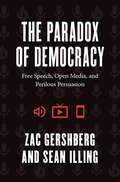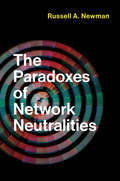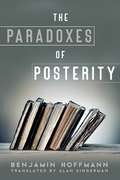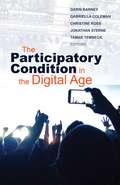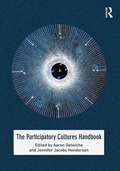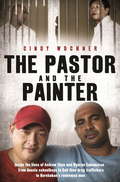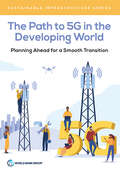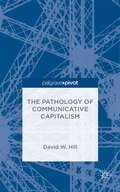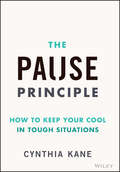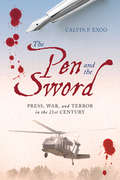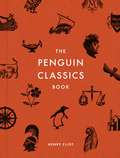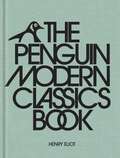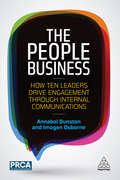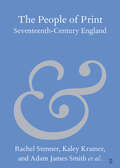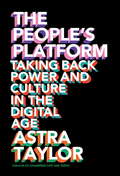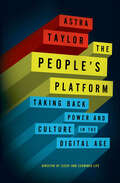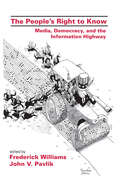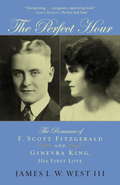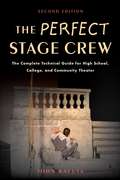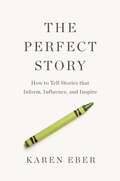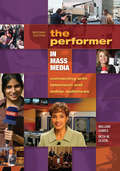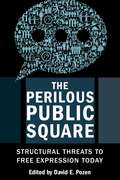- Table View
- List View
The Paradox of Democracy: Free Speech, Open Media, and Perilous Persuasion
by Zac Gershberg Sean IllingA thought-provoking history of communications that challenges ideas about freedom of speech and democracy. At the heart of democracy lies a contradiction that cannot be resolved, one that has affected free societies since their advent: Though freedom of speech and media has always been a necessary condition of democracy, that very freedom is also its greatest threat. When new forms of communication arrive, they often bolster the practices of democratic politics. But the more accessible the media of a society, the more susceptible that society is to demagoguery, distraction, and spectacle. Tracing the history of media disruption and the various responses to it over time, Zac Gershberg and Sean Illing reveal how these changes have challenged democracy—often with unsettling effects. The Paradox of Democracy captures the deep connection between communication and political culture, from the ancient art of rhetoric and the revolutionary role of newspapers to liberal broadcast media and the toxic misinformation of the digital public sphere. With clear-eyed analysis, Gershberg and Illing show that our contemporary debates over media, populism, and cancel culture are not too different from the democratic cultural experiences of the past. As we grapple with a fast-changing, hyper-digital world, they prove democracy is always perched precipitously on a razor’s edge, now as ever before.
The Paradoxes of Network Neutralities (Information Policy)
by Russell A. NewmanAn argument that the movement for network neutrality was of a piece with its neoliberal environment, solidifying the continued existence of a commercially driven internet.Media reform activists rejoiced in 2015 when the FCC codified network neutrality, approving a set of Open Internet rules that prohibitedproviders from favoring some content and applications over others—only to have their hopes dashed two years later when the agency reversed itself. In this book, Russell Newman offers a unique perspective on these events, arguing that the movement for network neutrality was of a piece with its neoliberal environment rather than counter to it; perversely, it served to solidify the continued existence of a commercially dominant internet and even emergent modes of surveillance and platform capitalism. Going beyond the usual policy narrative of open versus closed networks, or public interest versus corporate power, Newman uses network neutrality as a lens through which to examine the ways that neoliberalism renews and reconstitutes itself, the limits of particular forms of activism, and the shaping of future regulatory processes and policies.Newman explores the debate's roots in the 1990s movement for open access, the transition to network neutrality battles in the 2000s, and the terms in which these battles were fought. By 2017, the debate had become unmoored from its own origins, and an emerging struggle against “neoliberal sincerity” points to a need to rethink activism surrounding media policy reform itself.
The Paradoxes of Posterity
by Benjamin HoffmannThe impetus for literary creation has often been explained as an attempt to transcend the mortality of the human condition through a work addressed to future generations. Failing to obtain literal immortality, or to turn their hope toward the spiritual immortality promised by religious systems, literary creators seek a symbolic form of perpetuity granted to the intellectual side of their person in the memory of those not yet born while they write. In this book, Benjamin Hoffmann illuminates the paradoxes inherent in the search for symbolic immortality, arguing that the time has come to find a new answer to a perennial question: Why do people write?Exploring the fields of digital humanities and book history, Hoffmann describes posterity as a network of interconnected memories that constantly evolves by reserving a variable and continuously renegotiated place for works and authors of the past. In other words, the perpetual safeguarding of texts is delegated to a collectivity that is nonexistent at the moment when a writer addresses it, one whose nature is characterized by impermanence and instability. Focusing on key works by Denis Diderot, Étienne-Maurice Falconet, Giacomo Casanova, François-René de Chateaubriand, and Jean-Paul Sartre, Hoffmann considers the authors’ representations of posterity, the representation of authors by posterity, and how to register and preserve works in the network of memories. In doing so, Hoffmann reveals the three great paradoxes in the quest for symbolic immortality: the paradoxes of belief, of identity, and of mediation.Theoretically sophisticated and convincingly argued, this book contends that there is only one truly serious literary problem: the transmission of texts to posterity. It will appeal to specialists in literature, in particular eighteenth-century French literature, as well as scholars and students of philosophy and book history.
The Paradoxes of Posterity (G - Reference,information And Interdisciplinary Subjects Ser.)
by Benjamin HoffmannThe impetus for literary creation has often been explained as an attempt to transcend the mortality of the human condition through a work addressed to future generations. Failing to obtain literal immortality, or to turn their hope towards the spiritual immortality promised by religious systems, literary creators seek a symbolic form of perpetuity granted to the intellectual side of their person in the memory of those not yet born while they write. In this book, Benjamin Hoffmann illuminates the paradoxes inherent in the search for symbolic immortality, arguing that the time has come to find a new answer to the perennial question: Why do people write?Exploring the fields of digital humanities and book history, Hoffmann describes posterity as a network of interconnected memories that constantly evolves by reserving a variable and continuously renegotiated place for works and authors of the past. In other words, the perpetual safeguarding of texts is delegated to a collectivity not only nonexistent at the moment when a writer addresses it, but whose nature is characterized by impermanence and instability. Focusing on key works by Denis Diderot, Étienne-Maurice Falconet, Giacomo Casanova, François-René de Chateaubriand, and Jean-Paul Sartre, Hoffmann considers the authors’ representations of posterity, the representation of authors by posterity, and how to register and preserve works in the network of memories. In doing so, Hoffmann reveals the three great paradoxes in the quest for symbolic immortality: the paradoxes of belief, of identity, and of mediation.Theoretically sophisticated and convincingly argued, this book contends that there is only one truly serious literary problem: the transmission of texts to posterity. It will appeal to specialists in literature, in particular eighteenth-century French literature, as well as scholars and students of philosophy and book history.
The Participatory Condition in the Digital Age (Electronic Mediations #51)
by Christine Ross Jonathan Sterne Darin Barney Gabriella Coleman Tamar TembeckJust what is the &“participatory condition&”? It is the situation in which taking part in something with others has become both environmental and normative. The fact that we have always participated does not mean we have always lived under the participatory condition. What is distinctive about the present is the extent to which the everyday social, economic, cultural, and political activities that comprise simply being in the world have been thematized and organized around the priority of participation. Structured along four axes investigating the relations between participation and politics, surveillance, openness, and aesthetics, The Participatory Condition in the Digital Age comprises fifteen essays that explore the promises, possibilities, and failures of contemporary participatory media practices as related to power, Occupy Wall Street, the Arab Spring uprisings, worker-owned cooperatives for the post-Internet age; paradoxes of participation, media activism, open source projects; participatory civic life; commercial surveillance; contemporary art and design; and education. This book represents the most comprehensive and transdisciplinary endeavor to date to examine the nature, place, and value of participation in the digital age. Just as in 1979, when Jean-François Lyotard proposed that &“the postmodern condition&” was characterized by the questioning of historical grand narratives, The Participatory Condition in the Digital Age investigates how participation has become a central preoccupation of our time. Contributors: Mark Andrejevic, Pomona College; Bart Cammaerts, London School of Economics and Political Science (LSE); Nico Carpentier, Vrije Universiteit Brussel (VUB – Free University of Brussels) and Charles University in Prague; Julie E. Cohen, Georgetown University; Kate Crawford, MIT; Alessandro Delfanti, University of Toronto; Christina Dunbar-Hester, University of Southern California; Rudolf Frieling, California College of Arts and the San Francisco Art Institute; Salvatore Iaconesi, La Sapienza University of Rome and ISIA Design Florence; Jason Edward Lewis, Concordia University; Rafael Lozano-Hemmer; Graham Pullin, University of Dundee; Trebor Scholz, The New School in New York City; Cayley Sorochan, McGill University; Bernard Stiegler, Institute for Research and Innovation in Paris; Krzysztof Wodiczko, Harvard Graduate School of Design; Jillian C. York.
The Participatory Cultures Handbook
by Aaron Delwiche Jennifer Jacobs HendersonHow did we get from Hollywood to YouTube? What makes Wikipedia so different from a traditional encyclopedia? Has blogging dismantled journalism as we know it? Our media landscape has undergone a seismic shift as digital technology has fostered the rise of "participatory culture," in which knowledge is originated, created, distributed, and evaluated in radically new ways. The Participatory Cultures Handbook is an indispensable, interdisciplinary guide to this rapidly changing terrain. With short, accessible essays from leading geographers, political scientists, communication theorists, game designers, activists, policy makers, physicists, and poets, this volume will introduce students to the concept of participatory culture, explain how researchers approach participatory culture studies, and provide original examples of participatory culture in action. Topics include crowdsourcing, crisis mapping, grid computing, digital activism in authoritarian countries, collaborative poetry, collective intelligence, participatory budgeting, and the relationship between video games and civic engagement. Contributors include: Daren Brabham, Helen Burgess, Clay Calvert, Mia Consalvo, Kelly Czarnecki, David M. Faris, Dieter Fuchs, Owen Gallagher, Clive Goodinson, Alexander Halvais, Cynthia Hawkins, John Heaven, The Jannissary Collective, Henry Jenkins, Barry Joseph, Christopher Kelty, Pierre Lévy, Sophia B. Liu, Rolf Luehrs, Patrick Meier, Jason Mittell, Sarah Pearce, W. James Potter, Howard Rheingold, Suzanne Scott, Benjamin Stokes, Thomas Swiss, Paul Taylor, Will Venters, Jen Ziemke
The Pastor and the Painter: Inside the lives of Andrew Chan and Myuran Sukumaran from Aussie schoolboys to Bali 9 drug traffickers to Kerobokans redeemed men
by Cindy WocknerA very personal look at Andrew Chan and Myuran Sukumaran. Cindy Wockner was a journalist reporting the story of two surly drug smugglers. She was there from the beginning and would become a good friend of the two changed men.At 12.35 a.m. on 29 April 2015, Andrew Chan and Myuran Sukumaran were led out in front of a firing squad. Strapped to wooden crosses, they looked straight down the barrels of their killers' rifles. On that day, the Indonesian government did not execute two drug smugglers, they executed a pastor and a painter.But who were Andrew and Myuran?In 2005, the lure of drugs, money, fast cars and a better life led them and seven other Australians into a smuggling plot to import heroin from Indonesia to Australia. Unbeknownst to them all, the Australian Federal Police knew of their plan and tipped off the Indonesian authorities. Charged with drug trafficking, Myuran and Andrew were found guilty and sentenced to death. Andrew was 21 years old. Myuran was 24.At the time, Cindy Wockner was the Indonesia correspondent for News Limited: for a decade she covered their story and she got to know Myuran, Andrew and their families. They let her into their lives and she watched them transform from angry, defiant young inmates into fully rehabilitated, good men.This is the intimate, and untold, story of Andrew and Myuran. It details their redemption inside Kerobokan prison and their passion for helping others - through Andrew's growing commitment to his faith and Myu's burgeoning artistic talent. It reveals the boys they were and the men they became, in a potent cautionary tale and a poignant reminder of what we all lose when we ignore the power of mercy.'gripping' DAILY TELEGRAPH on Cindy Wockner and Madonna King's BALI 9
The Path to 5G in the Developing World: Planning Ahead for a Smooth Transition (Sustainable Infrastructure)
by World BankThe global race for implementing 5G mobile technologies has seen countries riding a new wave of wireless technologies. 5G—the next generation of mobile technologies—can enable a significantly higher level of performance over 4G mobile communications, providing a new layer of connectivity to support innovative, data-intensive applications. With the estimated impact of 5G on global gross domestic product to be in the trillions of US dollars, 5G’s deployment will drive innovation, job creation, worker productivity, and competitiveness across various sectors. Several use cases are already being tested, and deployment is under way in many countries. For some countries, 5G may seem a distant future prospect given the costs of infrastructure deployment and the need for expensive handsets; for other countries, 5G is an on-ramp to Industry 4.0 and has been folded into national strategy planning. 5G trials, pilots, and commercial deployments have been progressing around the world, but most deployments are in higher-income countries. Significant barriers remain for developing countries, many of which pertain to the challenges faced by the broader telecommunications sector and all of which threaten to further widen the digital divide and limit access to the economic opportunities that 5G connectivity enables. What does this reality mean for developing countries, and how can national governments prepare? The Path to 5G in the Developing World: Planning Ahead for a Smooth Transition surveys the technical capabilities of 5G and explores how countries can reach connectivity goals by using 5G as a layer of connectivity along with 4G and other technologies. This report also provides a guide for policy makers to better understand the opportunities, challenges, and risks posed by 5G so that they can plan for a policy and regulatory ecosystem that supports the path to advanced mobile network deployment, access, and adoption.
The Pathology of Communicative Capitalism
by David W. HillThis book diagnoses the social, mental and political consequences of working and economic organizations that generate value from communication. It is argued that cognitive labour is now a key productive force in the economy, bringing with it precarious working conditions in the form of impermanence, fragmentation and the immeasurability of work time; that the constant attentive stress of productive communication is pushing society over the brink of an urgent mental health crisis; and that in both our social and working lives we are being constrained into forms of communication that are less empathetic and communal. How can we resist these pathologies of communicative capitalism? In posing such a question it is necessary to rethink the role of communication technologies in order to imagine a healthier and altogether fairer society.
The Pause Principle: How to Keep Your Cool in Tough Situations
by Cynthia KaneBecome a better communicator during awkward, difficult, or tense moments in the workplace In The Pause Principle: How to Keep Your Cool in Tough Situations, renowned corporate communications expert Cynthia Kane reveals her tried-and-tested SOFTEN practice to better handle awkward, difficult, or tense conversations at work by breaking free of automatic reactions including shutting down, running away, yelling, or getting passive aggressive or defensive. In this book, readers will learn how to regulate their bodily responses and emotions to arrive at peaceful and productive resolutions during even the most challenging moments at work. With Kane's help, readers have the opportunity to make a profound impact in their organizations, both interpersonally and quantitatively by reducing miscommunications and therefore corporate errors. This book explores topics such as: The fight, flight, or freeze response, and why it's actually a very effective evolution strategy in the wilderness—just not in the workplace The true financial cost of corporate miscommunication, estimated to be $4,200 per employee per year The importance of mindfulness in work and life, and its key role in calming the human nervous system during stressful situations The Pause Principle: How to Keep Your Cool in Tough Situations earns a well-deserved spot on the bookshelves of corporate leaders, executives, managers, and all individuals seeking proven strategies to smoothly navigate stressful social situations in the workplace.
The Pen and the Sword: Press, War, and Terror in the 21st Century
by Calvin F. ExooAn eye-opening case study of the news at war, introducing a critical perspective on our mass mediaThe Pen and the Sword is the only comprehensive examination of how the media have covered the 21st Century's #1 news story: terrorism and the wars in Afghanistan and Iraq. This is the full story—from 9/11 to the Obama doctrine, and including:The war in Afghanistan. There were two sides to this story, but the press told only one, and the untold story would return to haunt us. The campaign for war in Iraq. What did the press know and when did they know it about the web of lies that led us into war?Iraq, from invasion to "Mission Accomplished." When the story of war is told as patriotic hymn, Playstation game, or melodrama of macho heroes and bad guys dressed in black, important things are left out.Aftermath, from "Mission Accomplished" to the present. Something has changed since the Vietnam War, when the press finally found its critical voice. However, the 21st Century media continue to cling to an untenable, pro-war story, even after the public has abandoned it. The Pen and the Sword uses this tragic and eye-opening case study of the news at war to ask, "Why?" and to offer a critical perspective on our mass media, including the latest information on the underpinnings of the news business—corporate ownership, the power of elites to define the news—and adds three important new features of the media landscape: The media profit crisis of the late '00s and how it is affecting the news. The creation and mainstreaming of a new right-wing media surround-sound system. The increasing importance of entertainment media and soft news in shaping our views.
The Penguin Classics Book
by Henry Eliot**Shortlisted for Waterstones Book of the Year**The Penguin Classics Book is a reader's companion to the largest library of classic literature in the world.Spanning 4,000 years from the legends of Ancient Mesopotamia to the poetry of the First World War, with Greek tragedies, Icelandic sagas, Japanese epics and much more in between, it encompasses 500 authors and 1,200 books, bringing these to life with lively descriptions, literary connections and beautiful cover designs.
The Penguin Modern Classics Book
by Henry EliotThe essential guide to twentieth-century literature around the worldFor six decades the Penguin Modern Classics series has been an era-defining, ever-evolving series of books, encompassing works by modernist pioneers, avant-garde iconoclasts, radical visionaries and timeless storytellers.This reader's companion showcases every title published in the series so far, with more than 1,800 books and 600 authors, from Achebe and Adonis to Zamyatin and Zweig.It is the essential guide to twentieth-century literature around the world, and the companion volume to The Penguin Classics Book.Bursting with lively descriptions, surprising reading lists, key literary movements and over two thousand cover images, The Penguin Modern Classics Book is an invitation to dive in and explore the greatest literature of the last hundred years.
The Pentagon Papers: Making History at the Washington Post
by Katharine GrahamDrawn from Katharine Graham’s Pulitzer Prize-winning memoir Personal History, a dramatic account of how she piloted the Washington Post through the Pentagon Papers and Watergate crises. After inheriting the Post from her father, and assuming its leadership in 1963 after the death of her husband, Graham found herself unexpectedly playing a role in history. Here she recounts the riveting episodes that transformed a shy widow into a newspaper legend, as she defied the government to publish the Pentagon Papers’ secrets about the Vietnam War and then led the way in exposing the Watergate scandal. Graham gives us an intimate behind-the-scenes view of the tense debates and high stakes she and her editors faced, and concludes with a powerful argument for the freedom of the press as a bulwark against abuses of power. An ebook short.
The People Business: How Ten Leaders Drive Engagement Through Internal Communications
by Annabel Dunstan Imogen OsborneThe People Business offers readers a unique, inside perspective on what works and what doesn't in the world of corporate internal communication and strategy. Featuring interviews with senior practitioners from a diverse range of leading firms, the book offers a refreshingly honest perspective on the practices and challenges facing IC today. Senior IC leads will offer their tips for success, what they have learned along the way, and what remains challenging.The book will also explore how IC is still, in some companies, struggling to be seen as a credible contributor to business performance. The People Business enables readers to prove its value to senior company members by demonstrating its clear impact on ROI.
The People of Print: Seventeenth-Century England (Elements in Publishing and Book Culture)
by Jennifer Young Joe Saunders Rachel Stenner Michael Durrant Kaley Kramer Adam James Smith William Clayton Georgina E. Wilson Alan B. Farmer Benjamin Woodring Verônica Calsoni Lima Rosalind JohnsonThis collection profiles understudied figures in the book and print trades of the seventeenth century. With an equal balance between women and men, it intervenes in the history of the trades, emphasising the broad range of material, cultural, and ideological work these people undertook. It offers a biographical introduction to each figure, placing them in their social, professional, and institutional settings. The collection considers varied print trade roles including that of the printer, publisher, paper-maker, and bookseller, as well as several specific trade networks and numerous textual forms. The biographies draw on extensive new archival research, with details of key sources for further study on each figure. Chronologically organised, this Element offers a primer both on numerous individual figures, and on the tribulations and innovations of the print trade in the century of revolution.
The People's Platform
by Astra TaylorFrom a cutting-edge cultural commentator and documentary filmmaker, a bold and brilliant challenge to cherished notions of the Internet as the great democratizing force of our age. The Internet has been hailed as a place where all can be heard and everyone can participate equally. But how true is this claim? In a seminal dismantling of techno-utopian visions, The People's Platform argues that for all that we "tweet" and "like" and "share," the Internet in fact reflects and amplifies real-world inequities at least as much as it ameliorates them. Online, just as off-line, attention and influence largely accrue to those who already have plenty of both. What we have seen in the virtual world so far, Astra Taylor says, has been not a revolution but a rearrangement. Although Silicon Valley tycoons have eclipsed Hollywood moguls, a handful of giants like Amazon, Apple, Google and Facebook still dominate our lives. And the worst habits of the old media model--the pressure to be quick and sensational, to seek easy celebrity, to appeal to the broadest possible public--have proliferated online, where every click can be measured and where "aggregating" the work of others is the surest way to attract eyeballs and ad revenue. In a world where culture is "free," creative work has diminishing value, and advertising fuels the system, the new order looks suspiciously just like the old one. We can do better, Taylor insists. The online world does offer an unprecedented opportunity, but a democratic culture that supports diverse voices, work of lasting value, and equitable business practices will not appear as a consequence of technology alone. If we want the Internet to truly be a people's platform, we will have to make it so.
The People's Platform: Taking Back Power and Culture in the Digital Age
by Astra Taylor“An invaluable primer for anyone seeking to understand why our networked world isn’t all that it is cracked up to be.” —The GuardianThe Internet has been hailed as an unprecedented democratizing force, a place where everyone can be heard and all can participate equally. But how true is this claim? In a seminal dismantling of techno-utopian visions, The People’s Platform argues that for all that we “tweet” and “like” and “share,” the Internet in fact reflects and amplifies real-world inequities at least as much as it ameliorates them. Online, just as off-line, attention and influence largely accrue to those who already have plenty of both.What we have seen so far, Astra Taylor says, has been not a revolution but a rearrangement. Although Silicon Valley tycoons have eclipsed Hollywood moguls, a handful of giants like Amazon, Apple, Google, and Facebook remain the gatekeepers. And the worst habits of the old media model—the pressure to seek easy celebrity, to be quick and sensational above all—have proliferated on the web, where “aggregating” the work of others is the surest way to attract eyeballs and ad revenue. When culture is “free,” creative work has diminishing value and advertising fuels the system. The new order looks suspiciously like the old one.We can do better, Taylor insists. The online world does offer a unique opportunity, but a democratic culture that supports diverse voices and work of lasting value will not spring up from technology alone. If we want the Internet to truly be a people’s platform, we will have to make it so.“Beautifully written and highly recommended.” —David Byrne, musician and author
The People's Right To Know: Media, Democracy, and the Information Highway (LEA Telecommunications Series)
by John V. Pavlik Frederick WilliamsThis important volume presents the pros and cons of a national service that will meet the information needs and wants of all people. In the preface, Everette E. Dennis, Executive Director of The Freedom Forum Media Studies Center, asks, "What will a true information highway -- where most citizens enjoy a wide range of information services on demand -- do to local communities, government, and business entities, other units of society and democracy itself?" It is no longer a question of whether a vastly expanded "information highway" will be built in America. Telephone and cable companies have already inaugurated their plans, and government will most likely incorporate such plans into the economic development policy of the late 1990s. The key questions remaining are: Who will pay for it? and Whom exactly will it serve? The People's Right to Know suggests that serving the everyday citizen should be the main objective of any national initiatives in this area. It counsels that evolving electronic services are new communications media that should be deployed with a main focus on the public's needs, interests, and desires. If advances in the nation's public telephone network will make information services as easy to use as ordinary voice calls, or newspapers promise vast new electronic services awaiting their readers, more attention must also be devoted to the information needs and wants of everyday citizens. In our increasingly multicultural and technology-driven society, enormous inequities exist across America's socioeconomic classes regarding access to information critical to everyday life. If an information highway is to be effective, we need to ensure that all Americans have access to it; its design must start with the everyday citizen. This powerful new medium at our disposal must consider policy that includes attempts to close the information gap among our citizens. It must ensure equal access to data regarding job, education, and health information services; legal information on such topics as immigration; and transactional services that offer assistance on such routine but time-consuming tasks as renewing a driver's license or registering to vote. Media and telecommunications professionals, communication scholars, and policymakers, including two former chairmen of the Federal Communications Commission, provide insights and pointed commentary on the nature and shape of an information highway designed as a new public medium aimed at serving a wide range of public needs. Their work should improve our basis for deciding if there are means by which an enhanced public telecommunications network can benefit the everyday working American.
The Perfect Hour: The Romance of F. Scott Fitzgerald and Ginevra King, His First Love
by James L. W. West IiiIn The Perfect Hour, biographer James L. W. West III reveals the never-before told story of the romance between F. Scott Fitzgerald and his first love, Ginevra King. They met in January 1915, when Scott was nineteen, a Princeton student, and sixteen-year-old Ginevra, socially poised and confident, was a sophomore at Westover School. Their romance flourished in heartfelt letters and quickly ran its course but Scott never forgot it. Ginevra became the inspiration for Isabelle Borgé in This Side of Paradise and the model for Daisy Buchanan in The Great Gatsby. Scott also wrote short stories inspired by her-including "Babes in the Woods" and "Winter Dreams," which, along with Ginevra's own story featuring Scott are reprinted in this volume. With access to Ginevra's personal diary, love letters, photographs, and Scott's own scrapbook, West tells the beguiling story of youthful passion that shaped Scott Fitzgerald's life as a writer. For Scott and Ginevra, "the perfect hour" was private code for a fleeting time they almost shared and then yearned after for the rest of their lives. Now West brings that perfect hour back to life in all its freshness, delicacy, and poignant brevity.
The Perfect Stage Crew: The Complete Technical Guide for High School, College, and Community Theater
by John KalutaHere is a must-have book for anyone producing a stage show without a Broadway-sized budget. Written by a technical theater veteran, The Perfect Stage Crew explains the pitfalls to avoid and provides solutions to the most common-and the most complex-stage performance problems, even for theaters with a lack of resources. An invaluable guide for middle and high school theaters, college theaters, and community theaters, The Perfect Stage Crew teaches readers how to:Stock, organize, and store the essential backstage suppliesConceptualize, design, and build setsManage a stage crew effectivelyPaint scenery and backdropsTest, design, and hang lightingOperate and repair sound equipmentSet cuesPromote your showThis expanded second edition covers up-to-date technology, including for use with recording, sound, and lighting. Chapters also cover such crucial topics as running technical rehearsals, gathering props, and creating and selling tickets. Theater groups that need to learn the nuts and bolts of putting a show together will discover how to turn backstage workers into The Perfect Stage Crew.Allworth Press, an imprint of Skyhorse Publishing, publishes a broad range of books on the visual and performing arts, with emphasis on the business of art. Our titles cover subjects such as graphic design, theater, branding, fine art, photography, interior design, writing, acting, film, how to start careers, business and legal forms, business practices, and more. While we don't aspire to publish a New York Times bestseller or a national bestseller, we are deeply committed to quality books that help creative professionals succeed and thrive. We often publish in areas overlooked by other publishers and welcome the author whose expertise can help our audience of readers.
The Perfect Story: How to Tell Stories that Inform, Influence, and Inspire
by Karen Eber"Come for the engrossing content, and stay for the lessons that might just change how you talk, write, and lead.&” —Adam GrantLearn how to take any story and make it perfect—from storytelling expert Karen Eber, whose popular TED Talk on the subject continues to be a source of inspiration for millions.What makes a story perfect? How do you tell the perfect story for any occasion?We live in a story world. Stories are a memorable and engaging way to differentiate yourself, build connection and trust, create new thinking, bring meaning to data, and even influence decision-making. But how do you turn a good story into a great story that informs, influences, and inspires?In The Perfect Story, Karen Eber—leadership consultant, professional keynote storyteller, and TED speaker—shares the science of storytelling to teach you to:Leverage the Five Factory Settings of the Brain to hack the art of storytellingBuild a toolkit of endless story ideasDefine the audience for your storyApply a memorable story structureEngage senses and emotionsTell stories with dataAvoid common storytelling mistakesUse your body to tell dynamic storiesEnsure your story doesn't manipulateNavigate and embrace the vulnerability of storytellingWithout relying on complicated models or one-size-fits-all prescriptions, this book makes storytelling accessible with practical and impactful steps for anyone to tell the perfect story for any occasion.Through interview vignettes, The Perfect Story also shares approaches from different storytellers, including the Sundance Institute cofounder, an executive producer of The Moth, the former creative director at Pixar, the TED Radio Hour podcast host, and many more.Whether you are leading a team, giving a presentation, hosting a podcast, selling a product or service, interviewing for a job, or giving a toast at a wedding, The Perfect Story will help you take your stories and make them perfect.
The Performative Presidency
by Jason L. MastThe Performative Presidency brings together literatures describing presidential leadership strategies, public understandings of citizenship, and news production and media technologies between the presidencies of Theodore Roosevelt and Bill Clinton, and details how the relations between these spheres have changed over time. Jason L. Mast demonstrates how interactions between leaders, publics, and media are organized in a theatrical way, and argues that mass mediated plot formation and character development play an increasing role in structuring the political arena. He shows politics as a process of ongoing performances staged by motivated political actors, mediated by critics, and interpreted by audiences, in the context of a deeply rooted, widely shared system of collective representations. The interdisciplinary framework of this book brings together a semiotic theory of culture with concepts from the burgeoning field of performance studies.
The Performer in Mass Media: Connecting with Television and Online Audiences
by Beth OlsonThis book is a concise guide written by two individuals who have been there—under the lights and in front of the camera. Its no-nonsense approach offers readers practical advice about on-camera performance, including key aspects of voice, movement, communication and appearance. It gives them a foundation for working in the studio, in the field and in front of an audience; it is ideal for media performers of any type, including those who work as reporters, company spokespersons, or community advocates.Recommendations include how to properly position oneself for a shot, how to improve articulation, how to deal with stress and how to best perform online. "Try-It-Out" exercises help readers put what they have learned into practice and prepare to be on camera. Key terms are bolded in the chapters and are collected in a book-end Glossary for easy reference.
The Perilous Public Square: Structural Threats to Free Expression Today
by David E. PozenAmericans of all political persuasions fear that “free speech” is under attack. This may seem strange at a time when legal protections for free expression remain strong and overt government censorship minimal. Yet a range of political, economic, social, and technological developments have raised profound challenges for how we manage speech. New threats to political discourse are mounting—from the rise of authoritarian populism and national security secrecy to the decline of print journalism and public trust in experts to the “fake news,” trolling, and increasingly subtle modes of surveillance made possible by digital technologies.The Perilous Public Square brings together leading thinkers to identify and investigate today’s multifaceted threats to free expression. They go beyond the campus and the courthouse to pinpoint key structural changes in the means of mass communication and forms of global capitalism. Beginning with Tim Wu’s inquiry into whether the First Amendment is obsolete, Matthew Connelly, Jack Goldsmith, Kate Klonick, Frederick Schauer, Olivier Sylvain, and Heather Whitney explore ways to address these dangers and preserve the essential features of a healthy democracy. Their conversations with other leading thinkers, including Danielle Keats Citron, Jelani Cobb, Frank Pasquale, Geoffrey R. Stone, Rebecca Tushnet, and Kirsten Weld, cross the disciplinary boundaries of First Amendment law, internet law, media policy, journalism, legal history, and legal theory, offering fresh perspectives on fortifying the speech system and reinvigorating the public square.
